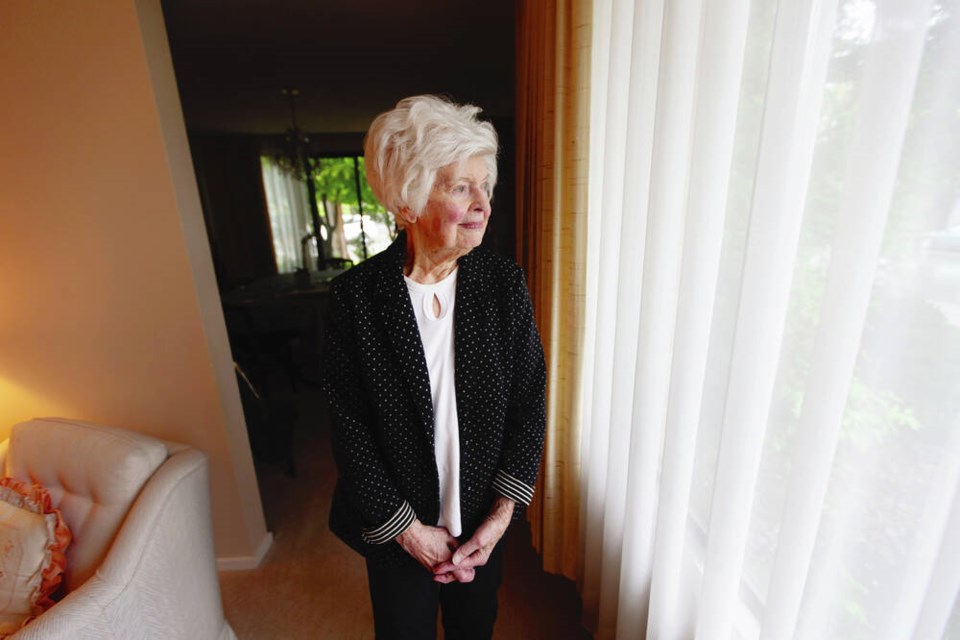Stella Higgins still remembers huddling with her parents over the radio in their home in Rutherglen, Scotland, as the BBC broke the news of D-Day, the Allied invasion of Normandy on June 6, 1944.
Higgins, who was born in Baillieston, Scotland, and will celebrate her 100th birthday in October, said the news did not bring her joy. While it’s seen now as a pivotal moment, the war had been raging for almost five years by that point, and she didn’t want to get her hopes up that the end was in sight.
It was, for her, just another battle.
“I had mixed emotions even when they announced [Victory in Europe] Day,” said Higgins, who still lives independently in Oak Bay.
“I felt the pain of what happened. I used to play tennis with a girl — we just hit the ball back and forth, really — who was blown to bits in 1940. One day I heard bombs coming down and landing at the end of the street. There were three bombs. One of them landed on a house with a family of three. They also had welcomed two people who had come up from London to escape the bombing there. All five of them died.”
She met her Victoria-born husband Richard “Dick” Higgins when he and his buddy stayed at her house for a weekend before reporting for duty at RAF Prestwick. He had joined the RCAF right after he turned 18 and had been assigned to 172 Squadron RAF Coastal Command.
“I never thought I would see him again. He had a grandmother and an aunt and uncle living in London, so I assumed he would visit them when he got leave. But one Saturday, after I got home, my mother said: ‘We have a visitor’ and there he was.”
She said they took long walks, chatted about his training and got to know each other. When he had to return to base, he promised to keep in touch. Over the next year, they corresponded. “It was very slow — we just drifted together, I suppose,” said Higgins.
The couple married April 6, 1943, in the Rutherglen parish church and moved to their matrimonial home — two rooms above a dairy — in the village of Braunton, near the RAF Coastal Command Station at Chivenor in North Devon.
Her husband served as a wireless operator, air gunner and radar operator on Wellington bombers sent on search and destroy missions in the Bay of Biscay, looking for German U-boats that would surface to recharge their batteries under cover of darkness.
The bombers were equipped with a 22-million candle-power searchlight, called the Leigh Light, slung under the fuselage, which allowed the crew to illuminate their targets in the middle of the night.
Higgins still has her husband’s aircrew logbook that details his patrols, including his first U-boat hunt on Oct. 5, 1942.
One night, one of the bombers was shot down, with the red fire in the sky seen miles away on shore. “I was sick to my pit,” Higgins says. “There were so many aircrew that didn’t come back.”
Wartime life had its simple pleasures, however, including finding and buying a bicycle in Braunton and using it to explore the region. She was not the only one happy with her find.
“My husband was delighted, as it meant that he then did not have to walk all the way to the base.”
To escape the war, Higgins, with her eight-month-old daughter, Norma, in tow, made a perilous voyage across the Atlantic for safety in Canada in January 1945. The trip in the middle of winter was rough and it took them two weeks to travel from Glasgow to Halifax.
“We were so glad we got there, after two weeks in that small tub in the middle of the Atlantic,” said Higgins. “The last two to three days we did not see our navy escort, but they may have been there in the periphery.”
She made her way to Victoria, where her in-laws lived, and settled here. Her husband joined her after the war and worked with the provincial government for 37 years, the majority of that time in the Civil Service Commission. He passed away July 15, 2007.
Higgins pursued her post-secondary education at the recently formed University of Victoria, enrolling as one of the first women to study for a bachelor’s degree. She graduated in 1966.
“I still remember the university was little more than a muddy field at that time.”
She went on to complete a master’s degree in history in 1972. Her M.A. thesis was Colonial Vancouver Island and British Columbia as Seen through British Eyes, 1849-1871.
Upon graduating, she worked as a research assistant for professor emeritus and military historian Reg Roy, spending years researching and writing on military topics. She also helped launch the Torch, the university’s alumni publication.
She supported the university’s Veterans Oral History Project, which matches undergraduate students with veterans and their families to archive stories of their service in war and peacekeeping missions.
Given her years, she has reluctantly given up her driver’s licence. But as her 100th birthday draws near, the spirit that got her through the war years has not waned.
“I am still a tough old Scot.”



